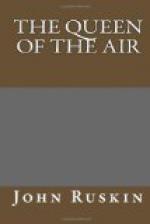There is, indeed, often great delightfulness in the innocent manners of artists who have real power and honesty, and draw in this way or that, as best they can, under such and such untoward circumstances of life. But the greater part of the looseness, flimsiness, or audacity of modern work is the expression of an inner spirit of license in mind and heart, connected, as I said, with the peculiar folly of this age, its hope of, and trust in, “liberty,” of which we must reason a little in more general terms.
148. I believe we can nowhere find a better type of a perfectly free creature than in the common house-fly. Nor free only, but brave; and irreverent to a degree which I think no human republican could by any philosophy exalt himself to. There is no courtesy in him; he does not care whether it is king or clown whom he teases; and in every step of his swift mechanical march, and in every pause of his resolute observation, there is one and the same expression of perfect egotism, perfect independence and self-confidence, and conviction of the world’s having been made for flies. Strike at him with your hand, and to him, the mechanical fact and external aspect of the matter is, what to you it would be if an acre of red clay, ten feet thick, tore itself up from the ground in one massive field, hovered over you in the air for a second, and came crashing down with an aim. That is the external aspect of it; the inner aspect, to his fly’s mind, is of a quite natural and unimportant occurrence—one of the momentary conditions of his active life. He steps out of the way of your hand, and alights on the back of it. You cannot terrify him, nor govern him, nor persuade him, nor convince him. He has his own positive opinion on all matters; not an unwise one, usually, for his own ends; and will ask no advice of yours. He has no work to do—no tyrannical instinct to obey. The earthworm has his digging; the bee her gathering and building; the spider her cunning network; the ant her treasury and accounts. All these are comparatively slaves, or people of vulgar business. But your fly, free in the air, free in the chamber—a black incarnation of caprice, wandering, investigating, flitting, flirting, feasting at his will, with rich variety of choice in feast, from the heaped sweets in the grocer’s window to those of the butcher’s back-yard, and from the galled place on your cab-horse’s back, to the brown spot in the road, from which, as the hoof disturbs him, he rises with angry republican buzz—what freedom is like his?
149. For captivity, again, perhaps your poor watch-dog is as sorrowful a type as you will easily find. Mine certainly is. The day is lovely, but I must write this, and cannot go out with him. He is chained in the yard because I do not like dogs in rooms, and the gardener does not like dogs in gardens. He has no books,—nothing but his own weary thoughts for company, and a group of those free flies,




